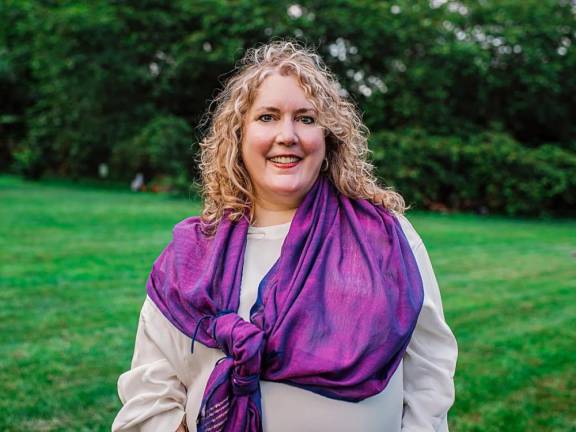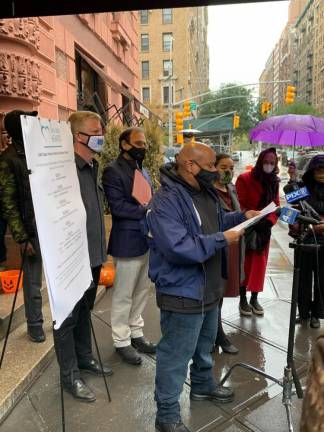The former chair of the Upper West Side Community Board 7 says that neighborhood groups who support or oppose use of the Lucerne Hotel as a shelter should sit down with each other and other stakeholders and work it out.
“Despite months of the Lucerne being in the headlines, most of the organized advocacy groups have still not met with each other,” said Elizabeth Caputo, who is now a Democratic candidate for Borough President of Manhattan. “Productive conversations have been few and far between, and there has been very little objective data and information distributed.”
Caputo proposed a “community conversation” about the Lucerne and the homelessness challenge that she said would also be a model for how she would encourage neighborhoods to work out conflicts if she is elected Borough President next year. She is one of five candidates seeking the Democratic nomination in next June’s primary.
“The whole goal here is to try to minimize the rancor and extreme feelings,” she explained. “There are so many appropriately strong feelings on many sides of this issue. The important thing is to hammer out some sort of road ahead and next steps.”
An emissary trusted by both sides would convene the conversation, Caputo said. She suggested current Manhattan Borough President Gale Brewer. “I think it’s a good idea,” said Brewer, when reached by phone Friday.
Caputo’s proposal echoed at a local level the tone of President-elect Joe Biden.
“Strong disagreements are inevitable in a democracy,” Biden said Friday night, adding: “The purpose of our politics isn’t total unrelenting, unending warfare. No, the purpose of our politics, the work of the nation, isn’t to fan the flames of conflict, but to solve conflicts.”
Private Meeting
To overcome the battle lines, Caputo offered a detailed timeline, beginning with an as private-as-possible meeting of key organizations before November 16, when a Manhattan judge, Debra James, is due to take up legal arguments over whether the city can proceed with its previously announced plan to move the men sheltered at the Lucerne.
Keeping the first community conversation meeting as private as possible would allow the parties, who have exchanged angry statements and press releases, to share their views without the immediate pressure of press opportunities or raucous town hall meetings, Caputo said.
The debate has become increasingly strident, a microcosm of the kind of polarization that has plagued national politics. Both sides have filed legal arguments along with contradictory affidavits from men sheltered at the Lucerne, some praising conditions, others condemning them.
The Upper West Side Open Hearts Initiative welcomed the men to the neighborhood and described opponents of the shelter as “racist” and NIMBYists. This infuriated the opponents, who had convened first on a Facebook page and then as the West Side Community Organization. They replied that Open Hearts was lead by ideologues who invoked antiracism theory to cancel relevant discussions of crime and quality of life in the neighborhood.
“Having each side operate in its own vacuum furthers the divisiveness that we don’t want and can’t afford to have in the city right now,” Caputo said.
On October 8, Open Hearts wrote to WestCo inviting them to work together on the challenge of serving the men at the Lucerne. But WestCo did not take up the invite because, according to members, it appeared to set as a precondition that Westco abandon its efforts to move the men.
Caputo, who lives on the West Side, said she is “opposed to the displacement of the Lucerne residents” but that neighbors who resisted the shelter have legitimate views that should be heard. “The only precondition is that we would have one representative [from each group] join the meeting and commit to one 60-90 minute virtual meeting with other stakeholders,” she said.
NYPD Surveillance Video
The plan to close the Lucerne shelter had been worked out with City Hall by the WestCo attorney, Randy Mastro. Shortly after Justice Adams blocked the transfer on October 19, Mastro’s East Side home was attacked with eggs, glue and red painted slogans such as: “you can’t displace us.”
On election day, the New York Police Department Crime Stoppers Program released a surveillance video showing at least 13 black-clad vandals arriving at Mastro’s home by bicycle. The police asked anyone with information to call NYPD’s Crime Stoppers Hotline at 1-800-577-TIPS (8477) or for Spanish, 1-888-57-PISTA (74782). The public Tips can also be submitted on the CrimeStoppers website or on Twitter @NYPDTips.
When the men, most of whom have substance abuse and mental health challenges, moved into the Lucerne on July 27, crime in the precinct spiked. But after intervention by the police, the Open Hearts initiative and the managers of the shelter, Project Renewal, the neighborhood is much calmer. Crime in the precinct, the 20th, is now running below last year’s level.
One prominent official said there had been hope that with the situation improving the sides could be brought together. But this has proven difficult because of the strong views and hard feelings.
Caputo said the goal of the community conversation approach was to moderate the anger and create a roadmap - “based on objective data and facts, not judgment or biased opinions” - “to best serve the sheltered population in question and address the broader issue of homelessness on the Upper West Side.”
After the small meeting called for by Caputo, a virtual public meeting or town hall “will be held to roll out the Community Conversation Plan and seek final community input.” Neighborhood representatives would then seek “a commitment from City Hall and the private sector to enact the Community Conversation Plan, with a specific timeline for action. Our City leaders cannot delay any longer.”
In a city where progressive politics are increasingly dominant, the Lucerne has become a popular campaign stop for candidates for mayor and other offices. One mayoral candidate, Shaun Donovan, stood in front of the hotel last week and said: “Instead of closing the door to our neighbors in need, we need leadership that will bring all New Yorkers together to reimagine the right to shelter in New York City as a right to housing.”
“Donovan joins a long list of elected officials and candidates who have stood with the men of the Lucerne,” Open Hearts Initiative said in a news release. This includes all five of the candidates for Borough President.
However, Caputo, who served as chair of CB 7 from 2013 to 2016, appears to be the first to offer a specific plan for bridging the community divide. CB 7 covers the Upper West Side from 59th St. to 110th St.
In her day job, Caputo is in charge of engagement with the US government for The World Economic Forum.
“The whole goal here is to try to minimize the rancor and extreme feelings. There are so many appropriately strong feelings on many sides of this issue. The important thing is to hammer out some sort of road ahead and next steps.” Elizabeth Caputo, candidate for Manhattan Borough President

